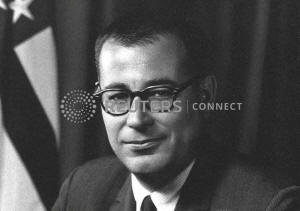|
Harold Brown, U.S. defense chief who
built, then strove to contain nuclear weapons, dies at 91
 Send a link to a friend
Send a link to a friend
 [January 07, 2019]
By Will Dunham [January 07, 2019]
By Will Dunham
WASHINGTON (Reuters) - Harold Brown, an
advocate of nuclear arms control who as President Jimmy Carter's defense
secretary tried but failed to win U.S. Senate approval of a key treaty
with the Soviet Union, has died at age 91, the think tank where he
worked said.
Brown, a native New Yorker, was the first scientist to take the helm of
the large and complex U.S. military establishment. He was a physicist
who received his bachelor's degree at age 18 and his doctorate at 22.
Brown spent his professional life initially developing nuclear weapons
and then later striving to control them.
He died of pancreatic cancer at his home in Rancho Santa Fe, California,
on Friday, according to the Santa Monica-based RAND Corporation, where
Brown served on the board until his death.
"Harold Brown understood, perhaps better than any defense secretary
before him, the technological complexities and unprecedented dangers of
modern warfare," RAND president and chief executive officer Michael D.
Rich said. "He was also an educator and author who made tremendous
contributions to the advancement of science and the security of the
nation."

Brown became Pentagon chief in 1977 and left in 1981, deeply
disappointed that was unable to convince the Senate to back the nuclear
arms limitation treaty reached with the Soviet Union in 1979 dubbed SALT
II.
As defense secretary, he also was involved in planning the botched U.S.
military mission to rescue American hostages held in Iran that ended
with the deaths of eight U.S. service members in April 1980 and the
diminishment of U.S. prestige.
"The world is a dangerous place. But it has always been a dangerous
place," Brown told The Washington Post in December 1980. "All we're
offered is a reasonable change to make things work. Because I'm
temperamentally an optimist, I believe that's good enough."
At the Lawrence Livermore National Laboratory, Brown played a key part
in designing the Polaris missile warhead but arms control was
fundamental to his national security thinking.
He worked in the Pentagon during the presidency of Lyndon B. Johnson and
served during the Nixon administration as a member of an arms control
delegation for talks with the Soviets.
In 1979 he strongly supported SALT II, signed by Carter and Soviet
leader Leonid Brezhnev after seven years of talks, and served as the
Carter administration's chief spokesman in trying to win Senate
approval.
[to top of second column]
|

U.S. Secretary of Defense Harold Brown in an undated photo provided
by the U.S. Department of Defense. Brown served as the Secretary of
Defense from 1977 to 1981 under President Jimmy Carter. Courtesy
U.S. Defense Department/Handout via REUTERS

The treaty faced resistance not only from Republicans but from
within Carter's own Democratic Party.
As the Senate sharply debated it, Americans were taken hostage when
militants seized the U.S. Embassy in Tehran in November 1979. The
Soviets invaded Afghanistan the next month, and Carter withdrew the
treaty from Senate consideration.
The treaty restricted the number of Soviet and American strategic
weapons at a dangerous period of the Cold War. Before becoming
president, Reagan rejected the SALT II treaty as lopsided in favor
of the Soviets. But he and the Soviet Union observed its major
limitations until 1986.
Reagan moved ahead with fresh arms control efforts.
Brown also decided not to produce the B-1 bomber, a move that
prompted one Republican congressman to say, "They're breaking out
the vodka and caviar in Moscow." But Brown backed the development of
"stealth" technology.
After Reagan beat Carter in 1980, his Defense Secretary Caspar
Weinberger said his mission was "to rearm America."
Brown served as president of one of the top universities in the
United States, the California Institute of Technology, from 1969 to
1977. Before that, he served as secretary of the U.S. Air Force and
director of defense research and engineering under Defense Secretary
Robert McNamara.
Brown's wife Colene died last year, the RAND Corporation said.
(Reporting and writing by Will Dunham; Additional reporting by
Sharon Bernstein in Sacramento; Editing by Bill Trott and Daniel
Wallis )
[© 2019 Thomson Reuters. All rights
reserved.]
Copyright 2019 Reuters. All rights reserved. This material may not be published,
broadcast, rewritten or redistributed.
Thompson Reuters is solely responsible for this content.
 |